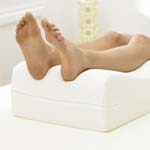 While dining out the other night, I overheard a woman at another table explaining why she was removing her rings from her fingers before dinner. This festive group had salt rimmed margaritas and bowls of salty tortilla chips generously spread before them.
While dining out the other night, I overheard a woman at another table explaining why she was removing her rings from her fingers before dinner. This festive group had salt rimmed margaritas and bowls of salty tortilla chips generously spread before them.
This woman shared that she knew how much she would regret not removing her rings now – otherwise she would risk having to get them cut off in the morning when her fingers turned into huge sausages.
Like most people, you’ve likely experienced that swollen feeling where your fingers or feet feel like they’ve doubled in size.
Excess water in the body tissues is commonly associated with too much salt intake. The sodium present in salt can cause some uncomfortable swelling in the fingers and other areas of the body.
Salt makes a person thirsty, so we consume more fluid – but retain it due to the sodium.
Sodium is one of the “usual suspects” with recent fluid retention and will normally resolve itself with proper diet.
Another culprit, though, could be edema (medical lingo for retaining water in the body) following a recent surgery. This is a more serious fluid retention situation and the best course of action is prevention.
Lying in bed (especially without being able to shift positions often) can lead to excess fluid buildup. Preparing for surgery requires lying still in the bed for a period of a couple hours during prep.
Recuperating, then, also requires some bed rest. However, a proper diet and exercise following surgery can make a big difference.
An important stipulation of course is to follow the proper discharge orders. However, people very often follow the “plenty of rest” aspect of the order while ignoring the “light exercise” clause.
Ongoing water retention following a surgery normally requires additional doctor’s visits and even more medications. Wouldn’t it have been better to circle the room a few times about every couple hours than to have to make an added visit to your follow-up appointment?
A little relaxing, deep breathing and light walking can make a big difference during a recovery. Not only can it help prevent excess water retention, but can help prevent other problems such as blood clots and even fluid in the lungs that are a higher risk post operatively due to immobility.
In addition to those benefits, breathing exercises and light movement can also improve your emotional well being and increase your stamina. All of this results in a much faster overall surgical recovery.
Again, it is important to get the okay from your medical professionals before undergoing any activities following medical procedures – especially major surgeries.
However, my all natural, non strenuous blood pressure exercise program accommodates nearly every level of movement ability. Best of all, you don’t have to suffer high blood pressure to benefit from these simple methods. Yes, they are great for those who need to normalize blood pressure but they can give your recovery an extra boost as well.
El331001

 Overcoming IBD
Overcoming IBD Multiple Sclerosis
Multiple Sclerosis Banishing Bronchitis
Banishing Bronchitis Gum Disease Gone
Gum Disease Gone Overcoming Onychomycosis
Overcoming Onychomycosis Neuropathy No More
Neuropathy No More The Prostate Protocol
The Prostate Protocol Brain Booster
Brain Booster
 Ironbound
Ironbound
 Solution for Shingles
Solution for Shingles
 The Bone Density Solution
The Bone Density Solution
 The Ultimate Healing Protocol
The Ultimate Healing Protocol
 The Parkinson's Protocol
The Parkinson's Protocol
 The Chronic Kidney Disease Solution
The Chronic Kidney Disease Solution
 Overthrowing Anxiety
Overthrowing Anxiety The Fatty Liver Solution
The Fatty Liver Solution The Hypothyroidism Solution
The Hypothyroidism Solution
 The End of Gout
The End of Gout The Blood Pressure Program
The Blood Pressure Program
 The Oxigized Cholesterol Strategy
The Oxigized Cholesterol Strategy
 Stop Snoring And Sleep Apnea Program
Stop Snoring And Sleep Apnea Program
 The Arthritis Strategy
The Arthritis Strategy The Vertigo & Dizziness Program
The Vertigo & Dizziness Program The 3-Step Diabetes Strategy
The 3-Step Diabetes Strategy Hemorrhoids Healing Protocol
Hemorrhoids Healing Protocol The Erectile Dysfunction Master
The Erectile Dysfunction Master Weight Loss Breeze
Weight Loss Breeze The IBS Program
The IBS Program The Insomnia Program
The Insomnia Program The Migraine and Headache Program
The Migraine and Headache Program The Neck Pain Solution
The Neck Pain Solution The Menopause Solution
The Menopause Solution The Ejaculation Master
The Ejaculation Master The TMJ Solution
The TMJ Solution The Acid Reflux Solution
The Acid Reflux Solution The Fibromyalgia Solution
The Fibromyalgia Solution The Psoriasis Strategy
The Psoriasis Strategy
very interesting subject and the article is educational
The article on fluid retention was not very informative. I would have
liked to see how much sodium is too much and what is normal
to prevent fluid retention. Thankyou,
I am about to have surgery, I will definately ask my surgeon how much walking I am able to do right after surgery. I now walk 2 miles a day for exercise, I will surely ask him how soon I can return to my regimin. It is good to know that walking is the best thing anyone can do following surgery.
Any info on how to dissolve a blood clot in the leg?